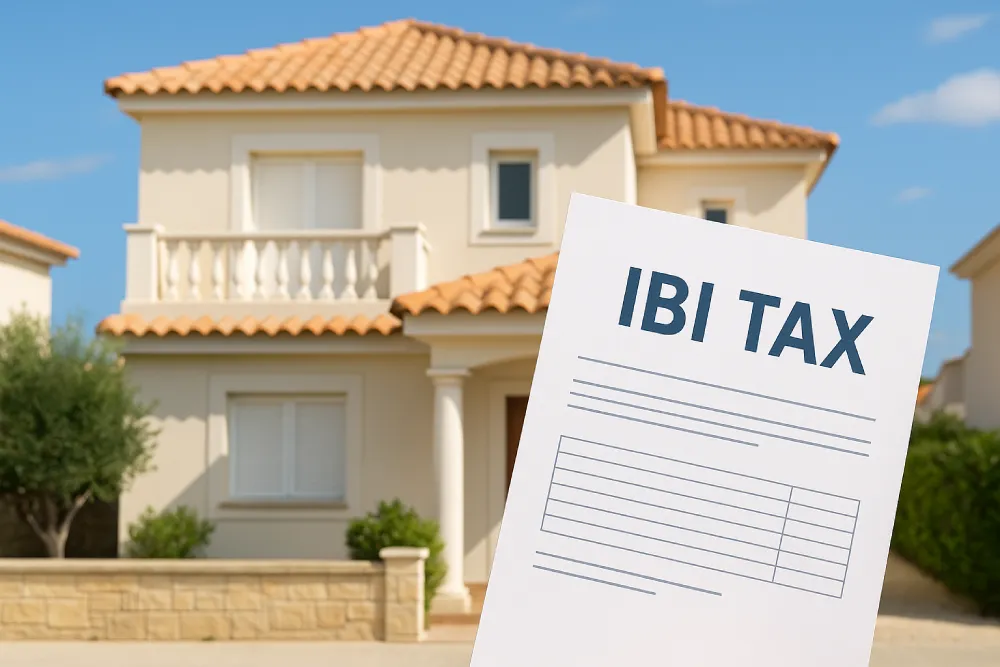Introduction
If you own property in Spain, understanding the
Impuesto sobre Bienes Inmuebles (IBI) is essential. This annual property tax is a local levy that applies to both residents and non-residents, and failing to pay it can result in penalties. In this guide, we’ll explain everything you need to know about IBI tax, including how it’s calculated, payment deadlines, and how to reduce your tax burden.
What is IBI Tax?
The
Impuesto sobre Bienes Inmuebles (IBI) is Spain’s equivalent of property tax. It is collected by local municipalities and is used to fund public services such as road maintenance, waste collection, and infrastructure improvements.
IBI is
mandatory for all property owners, regardless of whether they reside in Spain or not. Unlike other property-related taxes, it is based on the
cadastral value (valor catastral) of the property rather than its market value.
How is IBI Tax Different from Non-Resident Tax and Imputed Income Tax?
It is common for property owners to confuse IBI tax with
non-resident tax (Impuesto sobre la Renta de No Residentes) or
renta imputada (imputed income tax). However, they are separate obligations:
- IBI Tax: A municipal property tax paid annually, based on cadastral value. It does not have to be declared in a tax return.
- Non-Resident Tax: An income tax imposed on non-residents who own property in Spain. It applies whether the property is rented out or not.
- Renta Imputada: If the property is not rented, Spanish tax law considers that it generates a notional income (renta imputada), which must be declared in an annual non-resident tax return.
Unlike non-resident tax,
IBI is not submitted via a tax declaration; it is a direct payment to the local municipality.
For more information on
non-resident tax and renta imputada, visit our dedicated guide:
Non-Resident Tax in Spain (Modelo 210).
How is IBI Tax Calculated?
The amount of IBI you pay depends on the following factors:
- Cadastral Value: This is an official valuation assigned to your property by the local government. It considers factors such as location, size, condition, and use of the property.
- Municipal Tax Rate: Each local authority sets its own IBI tax rate, typically ranging between 0.4% and 1.3% of the cadastral value.
- Discounts and Reductions: Some municipalities offer reductions for families, historic buildings, or energy-efficient properties.
Example Calculation
Let’s say you own an apartment in Málaga with a cadastral value of
€100,000 and your local tax rate is
0.6%.
IBI Tax = €100,000 × 0.6% = €600 per year
How and When to Pay IBI Tax
IBI tax is due
annually, but the exact payment period depends on your municipality. Typically, payments are made between
September and November. In some municipalities the payment is split into several payments during the year.
Payment Methods:
- Direct debit (recommended for non-residents to avoid missing deadlines)
- Online payment via your local town hall’s website
- Bank transfer or in-person payment at designated banks
How is IBI Tax Paid When Buying a Property?
When purchasing a property in Spain, it is common for the
law firm handling the purchase to set up IBI tax payments on
direct debit. This ensures that payments are made automatically each year, helping non-residents avoid late fees or missed payments.
Failure to pay on time can result in penalties, interest, and even property seizure in extreme cases.
How to Check Your Property’s Cadastral Value
You can find your property’s cadastral value in:
- Your IBI bill from the local municipality
- The official Catastro website (requires NIE number and property details)
- Your property deed (Escritura Pública)
Consequences of Not Paying IBI Tax
If you miss the payment deadline, your local government can take enforcement action. The penalty process typically follows these stages:
- Late fees are added to your bill (usually 5-20%)
- Interest charges accrue over time
- Legal action may be taken, leading to property seizure
To avoid these risks, set up a
direct debit payment or use a tax advisory service.
Can You Reduce Your IBI Tax?
Yes! Here are some ways to potentially lower your IBI tax:
- Appealing your cadastral value: If you believe it is too high, you can request a reassessment.
- Applying for tax reductions: Some municipalities offer discounts for families, seniors, or energy-efficient properties.
- Checking for errors: Ensure your property details (size, use, etc.) are correctly recorded.
Conclusion
IBI tax is an essential responsibility for all property owners in Spain, including non-residents. Understanding how it’s calculated, when to pay it, and how to reduce it can save you money and prevent legal issues. If you need assistance with your Spanish property taxes, consider working with a tax advisory firm to ensure full compliance and potential savings.
Need help with IBI tax? Contact our tax experts today!
